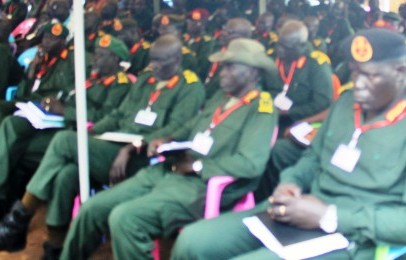South Sudan armed opposition faction says forces may deploy in Juba by mid-January
January 3, 2016 (ADDIS ABABA) – Thousands of components of the would-be joint integrated forces from the armed opposition faction of the Sudan People’s Liberation Movement (SPLM-IO) may deploy in the national capital, Juba, by mid-January, says opposition’s spokesperson.

The pre-transitional period, which started from the signing of the peace agreement, has however elapsed since 26 November 2015 and the deployment of joint forces in Juba has not taken place due to obstacles and delays faced in the implementation of the peace deal.
The two main rival factions of government and SPLM-IO have wasted a lot of time due to misunderstandings and violations of security and political provisions in the agreement, delaying establishment of institutions to kick off the implementation.
An advance team of the opposition faction finally arrived in Juba on 18 December 2015 after government lifted its objection to their return in “huge” numbers, but no significant steps have been taken by the peace parties in order to pave way for deployment of forces in the capital and formation of a transitional government of national unity.
The top leadership of the SPLM-IO is yet to return to Juba, pending resolution on main provisions of the peace agreement, as the implementation runs behind the schedule.
Spokesman of the SPLM-IO leadership told Sudan Tribune that although the designated First Vice President Riek Machar was eager to return to Juba, this would not happen until major provisions required for his return to the capital are first implemented by the advance team with the other stakeholders including the government.
“Our chairman and commander-in-chief will return to Juba any time soon. But this will not happen until major provisions in the peace agreement required for formation of a transitional government of national unity are implemented,” said James Gatdet Dak on Sunday.
He said among the provisions required first for implementation include amendment of the transitional constitution to incorporate the peace agreement, adding that this will also be based on the 10 states in accordance with the peace deal.
A transitional national legislature will also be reconstituted, he said, with membership from the opposition groups as stipulated in the peace agreement, adding this new national parliament will have to endorse the new transitional constitution after its amendment by the parties and signed by the president. This new constitution will then become the basis for formation of a transitional government, he said.
The opposition faction, he reiterated, does not recognize the recent unilaterally decreed 28 states by president Kiir and endorsed by “his faction’s national legislature.”
He also said there is need to withdraw government forces from Juba to 25km as stipulated in the peace agreement and for the joint forces to be deployed inside the capital.
“SPLA (IO) components of the joint police and military forces may reach Juba by mid-January. However, there is need for the government to first withdraw its excess forces from the capital as stipulated in the peace deal,” he said.
In October, government officials said they had withdrawn only 250 soldiers from Juba, but several thousands more are still in the capital.
Senior military sources from the government earlier admitted the existence of a split of opinion in the government over whether to fully implement the security arrangements or not, with some including the current chief of general staff, Paul Malong Awan, and other senior military commanders allegedly refusing to withdraw forces from Juba.
According to the peace agreement, the government should withdraw its forces and then each side in the conflict will deploy in Juba 1,500 well equipped police forces, making the total of 3,000 to provide the security in the capital.
Also the opposition will deploy another military force of over 1,400 troops in Juba, while the government will deploy over 3,000 military forces.
Out of the total 8,000 armed police and military forces that should be deployed in Juba, the government would have a total of about 5,000 while the opposition would have about 3,000.
Dak said the opposition forces to be deployed in the capital were coming from Upper Nile and Bahr el Ghazal regions and will team up in Juba with other components from Equatoria region.
He said as soon as such constitutional amendments and deployments of the joint forces are completed, including other necessities, Machar would then travel to Juba to form a government of national unity with President Kiir.
The opposition leader’s spokesman said they are committed to the speedy implementation of the peace agreement, saying they hoped the government will equally implement the peace deal as signed without further hindrance on political and security arrangements.
The Joint Monitoring and Evaluation Commission (JMEC), which has been established under the peace agreement with membership from representatives of the peace parties and regional and international bodies, and chaired by former president of Botswana, Festus Mogae, is expected to convene a meeting soon to start to resolve on pending issues.
A government of national unity will run the country for the next 30 months from formation at the end of which elections will be conducted country-wide.
Machar, according to the agreement, will become a first vice-president, with a quota of 10 ministerial positions allocated to his faction, a number of states to govern, as well as command a separate army for at least 18 months before unification of the two rival armies into one national army.
(ST)
